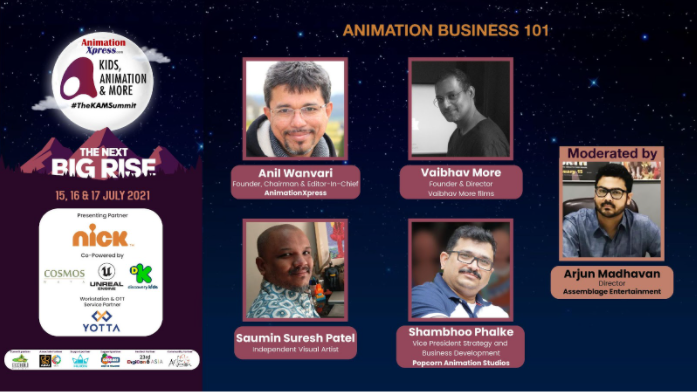
Vaibhav More Films founder and director Vaibhav More, Popcorn Animation Studios VP strategy and business development Shambhoo Phalke, independent visual artist Saumin Suresh Patel, and Animation Xpress founder, chairman, and editor-in-chief Anil Wanvari were the speakers who shared informative insights on animation business and the nitty-gritty of scaling up small-scale businesses. The panel discussion was moderated by Assemblage Entertainment director Arjun Madhavan.
The most successful people in life are disciplined. Discipline is made up of the basic tools we use to cope with life’s problems and challenges. Disciplined people have an organized system they operate from to become successful. Commenting on how important focusing on your work is, the panelists mentioned, “Once we know what we want to do and what our guiding principle is, it is important to bring in discipline that can empower us. If you don’t have passion, you cannot create discipline. And if you are really passionate, discipline comes on its own. Discipline just does not entail to one person, it has to be followed throughout. And that discipline needs to translate to systems that are measurable.”
Any business needs a quality product or service that the owner or doer can stand behind with pride. No profession at all is successful without following certain principles. Anil Wanvari’s take on the hygiene principles was one of the key highlights of the session. “It’s extremely important to get together with the right kind of people and if it’s you only, then you have to get the basics totally right. For starters, if you are just beginning, get your GST done,” he said.
Independent animation artists have their own challenges. While they might not always have a big budget to get things done, Saumin Suresh Patel shared something from his personal experience. He said, “We independent artists want to be free and money is not always a consideration. Not everyone is interested in opening a shop or studio. So, one way in which we can be free is by doing regular audits and maintaining Excel sheets. Whatever money you earn, if you can simply park 30 per cent and invest it, then Mathematics will do its job. The money will keep on compounding and growing.”
Shambhoo Phalke shared some wonderful nuggets of wisdom with respect to the animation business. “Whether a company is large-scale or small-scale, I have always preferred to go with three separate elements – creative, production and technical. If you see the wage part of it, the creative is the highest earner, the production is probably the lowest earner, and the technical is somewhere in between. Irrespective of the wages, the weightage given to them by me is equal,” he asserted. He further stated the importance of delegation by saying, “If anything is required to be done in a studio, you do not require the presence of all the key stake-holders. The decisions can be done with or without them and that much delegation needs to happen within the studio.”
Getting suitable people on-board to work with you is half the battle won. The right people are your highest valued asset. “The most important thing is finding the right kind of people; those who excel in their own areas. Also, getting the right kind of work that excites everyone is crucial,” commented Vaibhav More. He had a little note for the budding artists, “I would encourage students and those who are getting into the profession to adapt to the open-source culture. It really helps a lot in cutting the costs.”
The future of animation is going to be more interactive, more immersive, and more intelligent. Animation is for all ages and it is a powerful and universal communication medium. The beauty of animation is that it can tell a story even without the need for dialogues. “The way forward in the world of animation business belongs to the youth – the young energy, the dynamic professionals, and individuals who want to get into the profession,” asserted Arjun Madhavan.
While the animation industry has been still going, sometimes slower, amid the coronavirus crisis, that doesn’t mean it hasn’t been deeply affected. Animation studios, independent workers and production companies revealed that if transitioning to working from home has been fairly successful, the crisis has still had a varying impact on production pipelines, productivity and revenues, depending on the studio. However, the positive outcome of the current situation is that everyone has adapted to the work from home situation and we now know that workly remotely is quite feasible even when it comes to the animation industry.
Animation has always been more effective than most art forms at convincing viewers of its own magic and may its business always flourish.
Watch the entire session here from 53:35
